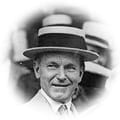

Calvin Coolidge on The Declaration of Independence
“It is not so much, then, for the purpose of undertaking to proclaim new theories and principles that this annual celebration is maintained, but rather to reaffirm and reestablish those old theories and principles which time and the unerring logic of events have demonstrated to be sound. Amid all the clash of conflicting interests, amid all the welter of partisan politics, every American can turn for solace and consolation to the Declaration of Independence and the Constitution of the United States with the assurance and confidence that those two great charters of freedom and justice remain firm and unshaken. Whatever perils appear, whatever dangers threaten, the Nation remains secure in the knowledge that the ultimate application of the law of the land will provide an adequate defense and protection.”
Calvin Coolidge address on 150th Anniversary of Declaration of Independence (July 5, 1926)
Worth remembering today as major parties prepare to nominate two of the least desirable candidates in living memory. The hope is that the bedrock covenants of the United States should see us through.
“We are obliged to conclude that the Declaration of Independence represented the movement of a people. It was not, of course, a movement from the top. Revolutions do not come from that direction. It was not without the support of many of the most respectable people in the Colonies, who were entitled to all the consideration that is given to breeding, education, and possessions. […] But the preponderance of all those who occupied a position which took on the aspect of aristocracy did not approve of the Revolution and held toward it an attitude either of neutrality or open hostility. [..] The American Revolution represented the informed and mature convictions of a great mass of independent, liberty loving, God-fearing people who knew their rights, and possessed the courage to dare to maintain them.”
Calvin Coolidge address on 150th Anniversary of Declaration of Independence (July 5, 1926)
Revolutions always come from the bottom. As John F. Parker observed, “the man holding four aces never asks for a new deal.”
“Governments do not make ideals, but ideals make governments. This is both historically and logically true. Of course the government can help to sustain ideals and can create institutions through which they can be the better observed, but their source by their very nature is in the people. The people have to bear their own responsibilities. There is no method by which that burden can be shifted to the government. It is not the enactment, but the observance of laws, that creates the character of a nation.”
Calvin Coolidge address on 150th Anniversary of Declaration of Independence (July 5, 1926)
Government officials have to observe laws and live up to the ideals as much as private citizens.
“About the Declaration there is a finality that is exceedingly restful. It is often asserted that the world has made a great deal of progress since 1776, that we have had new thoughts and new experiences which have given us a great advance over the people of that day, and that we may therefore very well discard their conclusions for something more modern. But that reasoning can not be applied to this great charter. If all men are created equal, that is final. If they are endowed with inalienable rights, that is final. If governments derive their just powers from the consent of the governed, that is final. No advance, no progress can be made beyond these propositions. If anyone wishes to deny their truth or their soundness, the only direction in which he can proceed historically is not forward, but backward toward the time when there was no equality, no rights of the individual, no rule of the people. Those who wish to proceed in that direction can not lay claim to progress. They are reactionary. Their ideas are not more modern, but more ancient, than those of the Revolutionary fathers.”
Calvin Coolidge address on 150th Anniversary of Declaration of Independence (July 5, 1926)
As entrepreneurs rebuild the infrastructure of the 21st century in software and communication protocols it’s imperative that they maintain these ideals of equality, inalienable rights, and consent of the governed.
